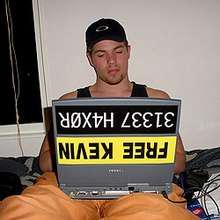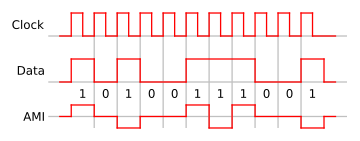Leet
Leet (or "1337"), also known as eleet or leetspeak, is a system of modified spellings used primarily on the Internet. It often uses character replacements in ways that play on the similarity of their glyphs via reflection or other resemblance. Additionally, it modifies certain words based on a system of suffixes and alternate meanings. There are many dialects or linguistic varieties in different online communities.

The term "leet" is derived from the word elite, used as an adjective to describe formidable prowess or accomplishment, especially in the fields of online gaming and computer hacking. The leet lexicon includes spellings of the word as 1337 or l33t.
History
Leet originated within bulletin board systems (BBS) in the 1980s,[1][2] where having "elite" status on a BBS allowed a user access to file folders, games, and special chat rooms. The Cult of the Dead Cow hacker collective has been credited with the original coining of the term, in their text-files of that era.[lower-alpha 1] One theory is that it was developed to defeat text filters created by BBS or Internet Relay Chat system operators for message boards to discourage the discussion of forbidden topics, like cracking and hacking.[1] Creative misspellings and ASCII-art-derived words were also a way to attempt to indicate one was knowledgeable about the culture of computer users.
Once the reserve of hackers, crackers, and script kiddies, leet has since entered the mainstream.[1] It is now also used to mock newbies, also known colloquially as noobs, or newcomers, on web sites, or in gaming communities.[3] Some consider emoticons and ASCII art, like smiley faces, to be leet, while others maintain that leet consists of only symbolic word encryption. More obscure forms of leet, involving the use of symbol combinations and almost no letters or numbers, continue to be used for its original purpose of encrypted communication. It is also sometimes used as a script language. Variants of leet have been used for censorship purposes for many years; for instance "@$$" (ass) and "$#!+" (shit) are frequently seen to make a word appear censored to the untrained eye but obvious to a person familiar with leet.
Leet symbols, especially the number 1337, are Internet memes that have spilled over into popular culture. Signs that show the numbers "1337" are popular motifs for pictures and shared widely across the Internet.
Orthography
One of the hallmarks of leet is its unique approach to orthography, using substitutions of other characters, letters, or otherwise, to represent letters in a word.[4][5] For more casual use of leet, the primary strategy is to use homoglyphs, symbols that closely resemble (to varying degrees) the letters for which they stand. The choice of symbol is not fixed: anything the reader can make sense of is valid. However, this practice is not extensively used in regular leet; more often it is seen in situations where the argot (i.e., secret language) characteristics of the system are required, either to exclude newbies or outsiders in general, i.e., anything that the average reader cannot make sense of is valid; a valid reader should himself try to make sense, if deserving of the underlying message. Another use for leet orthographic substitutions is the creation of paraphrased passwords.[1] Limitations imposed by websites on password length (usually no more than 36) and the characters permitted (e.g. alphanumeric and symbols)[6] require less extensive forms when used in this application.
Some examples of leet include B1ff and n00b, a term for the stereotypical newbie; the l33t programming language; and the web-comics Megatokyo and Homestuck, which contain characters who speak leet.
Morphology
Text rendered in leet is often characterized by distinctive, recurring forms.
- -xor suffix
- The meaning of this suffix is parallel with the English -er and -or suffixes (seen in hacker and lesser)[2] in that it derives agent nouns from a verb stem. It is realized in two different forms: -xor and -zor, /-sɔːr/ and /-zɔːr/, respectively. For example, the first may be seen in the word hax(x)or (H4x0r in leet) /ˈhæksɔːr/ and the second in pwnzor /ˈoʊnzɔːr/. Additionally, this nominalization may also be inflected with all of the suffixes of regular English verbs. The letter 'o' is often replaced with the numeral 0.
- -age suffix
- Derivation of a noun from a verb stem is possible by attaching -age to the base form of any verb. Attested derivations are pwnage, skillage, and speakage. However, leet provides exceptions; the word leetage is acceptable, referring to actively being leet.[7] These nouns are often used with a form of "to be" rather than "to have," e.g., "that was pwnage" rather than "he has pwnage". Either is a more emphatic way of expressing the simpler "he pwns," but the former implies that the person is embodying the trait rather than merely possessing it.
- -ness suffix
- Derivation of a noun from an adjective stem is done by attaching -ness to any adjective. This is entirely the same as the English form, except it is used much more often in Leet. Nouns such as lulzness and leetness are derivations using this suffix.
- Words ending in -ed
- When forming a past participle ending in -ed, the Leet user may replace the -e with an apostrophe, as was common in poetry of previous centuries, (e.g. "pwned" becomes "pwn'd"). Sometimes, the apostrophe is removed as well (e.g. "pwned" becomes "pwnd"). The word ending may also be substituted by -t (e.g. pwned becomes pwnt).[8]
- Use of the -& suffix
- Words ending in -and, -anned, -ant, or a similar sound can sometimes be spelled with an ampersand (&) to express the ending sound (e.g. "This is the s&box", "I'm sorry, you've been b&", "&hill/&farm"). It is most commonly used with the word banned. An alternate form of "B&" is "B7", as the ampersand is with the "7" key on the standard US keyboard. It is often seen in the phrase "IBB7" (in before banned), which indicates that the poster believes that a previous poster will soon be banned from the site, channel, or board on which they are posting.
Grammar
Leet can be pronounced as a single syllable, /ˈliːt/, rhyming with eat, by way of aphesis of the initial vowel of "elite". It may also be pronounced as two syllables, /ɛˈliːt/. Like hacker slang, leet enjoys a looser grammar than standard English.[3] The loose grammar, just like loose spelling, encodes some level of emphasis, ironic or otherwise. A reader must rely more on intuitive parsing of leet to determine the meaning of a sentence rather than the actual sentence structure. In particular, speakers of leet are fond of verbing nouns, turning verbs into nouns (and back again) as forms of emphasis, e.g. "Austin rocks" is weaker than "Austin roxxorz" (note spelling), which is weaker than "Au5t1N is t3h r0xx0rz" (note grammar), which is weaker than something like "0MFG D00D /\Ü571N 15 T3H l_l83Я 1337 Я0XX0ЯZ" (OMG, dude, Austin is the über-elite rocks-er!). In essence, all of these mean "Austin rocks," not necessarily the other options. Added words and misspellings add to the speaker's enjoyment. Leet, like hacker slang, employs analogy in construction of new words. For example, if haxored is the past tense of the verb "to hack" (hack → haxor → haxored), then winzored would be easily understood to be the past tense conjugation of "to win," even if the reader had not seen that particular word before.

Leet has its own colloquialisms, many of which originated as jokes based on common typing errors, habits of new computer users, or knowledge of cyberculture and history.[9] Leet is not solely based upon one language or character set. Greek, Russian, and other languages have leet forms, and leet in one language may use characters from another where they are available. As such, while it may be referred to as a "cipher", a "dialect", or a "language", leet does not fit squarely into any of these categories. The term leet itself is often written 31337, or 1337, and many other variations. After the meaning of these became widely familiar, 10100111001 came to be used in its place, because it is the binary form of 1337 decimal, making it more of a puzzle to interpret. An increasingly common characteristic of leet is the changing of grammatical usage so as to be deliberately incorrect. The widespread popularity of deliberate misspelling is similar to the cult following of the "All your base are belong to us" phrase. Indeed, the online and computer communities have been international from their inception, so spellings and phrases typical of non-native speakers are quite common.
Vocabulary
Many words originally derived from leet have now become part of modern Internet slang, such as "pwned".[1] The original driving forces of new vocabulary in leet were common misspellings and typing errors such as "teh" (generally considered lolspeak), and intentional misspellings,[10] especially the "z" at the end of words ("skillz").[1] Another prominent example of a surviving leet expression is w00t, an exclamation of joy.[2] w00t is sometimes used as a backronym for "We owned the other team."
New words (or corruptions thereof) may arise from a need to make one's username unique. As any given Internet service reaches more people, the number of names available to a given user is drastically reduced. While many users may wish to have the username "CatLover," for example, in many cases it is only possible for one user to have the moniker. As such, degradations of the name may evolve, such as "C@7L0vr." As the leet cipher is highly dynamic, there is a wider possibility for multiple users to share the "same" name, through combinations of spelling and transliterations.
Additionally, leet—the word itself—can be found in the screen-names and gamertags of many Internet and video games. Use of the term in such a manner announces a high level of skill, though such an announcement may be seen as baseless hubris.[11]
Terminology and common misspellings
Warez (nominally /wɛərz/) is a plural shortening of "software", typically referring to cracked and redistributed software.[11] Phreaking refers to the hacking of telephone systems and other non-Internet equipment.[1] Teh originated as a typographical error of "the", and is sometimes spelled t3h.[1][12] j00 takes the place of "you",[2] originating from the affricate sound that occurs in place of the palatal approximant, /j/, when you follows a word ending in an alveolar plosive consonant, such as /t/ or /d/. Also, from German, is über, which means "over" or "above"; it usually appears as a prefix attached to adjectives, and is frequently written without the umlaut over the u.[13]
Haxor and suxxor (suxorz)
Haxor, and derivations thereof, is leet for "hacker",[14] and it is one of the most commonplace examples of the use of the -xor suffix. Suxxor (pronounced suck-zor) is a derogatory term which originated in warez culture and is currently used in multi-user environments such as multiplayer video games and instant messaging; it, like haxor, is one of the early leet words to use the -xor suffix. Suxxor is a modified version of "sucks" (the phrase "to suck"), and the meaning is the same as the English slang. Suxxor can be mistaken with Succer/Succker if used in the wrong context. Its negative definition essentially makes it the opposite of roxxor, and both can be used as a verb or a noun. The letters ck are often replaced with the Greek Χ (chi) in other words as well.
n00b
Within leet, the term n00b, and derivations thereof, is used extensively. The word means and derives from newbie (as in new and inexperienced or uninformed),[10][13][15] and is used as a means of segregating them as less than the "elite," or even "normal," members of a group.
Owned and pwned
Owned and pwn3d (generally pronounced "owned" and "poned", respectively) both refer to the domination of a player in a video game or argument (rather than just a win), or the successful hacking of a website or computer.[16][17][18][1][13][19] It is a slang term derived from the verb own, meaning to appropriate or to conquer to gain ownership. As is a common characteristic of leet, the terms have also been adapted into noun and adjective forms,[13] ownage and pwnage, which can refer to the situation of pwning or to the superiority of its subject (e.g., "He is a very good player. He is pwnage.").
The term was created accidentally by the misspelling of "own" in video game design due to the keyboard proximity of "O" and "P." It implies domination or humiliation of a rival,[20] used primarily in the Internet-based video game culture to taunt an opponent who has just been soundly defeated (e.g., "You just got pwned!").[21] In 2015 Scrabble added pwn to their Official Scrabble Words list.[22]
Pr0n
Pr0n is slang for pornography.[1] This is a deliberately inaccurate spelling/pronunciation for porn,[15] where a zero is often used to replace the letter O. It is sometimes used in legitimate communications (such as email discussion groups, Usenet, chat rooms, and Internet web pages) to circumvent language and content filters, which may reject messages as offensive or spam. The word also helps prevent search engines from associating commercial sites with pornography, which might result in unwelcome traffic. Pr0n is also sometimes spelled backwards (n0rp) to further obscure the meaning to potentially uninformed readers.[lower-alpha 2] It can also refer to ASCII art depicting pornographic images, or to photos of the internals of consumer and industrial hardware. Prawn, a spoof of the misspelling, has started to come into use, as well; in Grand Theft Auto: Vice City, a pornographer films his movies on "Prawn Island". Conversely, in the RPG Kingdom of Loathing, prawn, referring to a kind of crustacean, is spelled pr0n, leading to the creation of food items such as "pr0n chow mein".
b&
b& or banned refers to when an individual is no longer allowed into an online community. Words containing -and-, anned-, ant-, or a similar sound can be replaced by the "&" symbol, meaning sandbox could be spelled as &box or even &[] (e.g. "skyrim is the best &box of 216 noCAP").[23]
See also
- Calculator spelling
- Elitism
- Faux Cyrillic
- Geek Code
- Jargon File, is a glossary and usage dictionary of computer programmer slang
Notes
- Æra.
- It can be observed by searching for "n0rp" on a search engine
Footnotes
- Mitchell.
- An Explanation of l33t Speak.
- Rome.
- Sterling, 70.
- Blashki & Nichol, 80.
- "Username and Password Guidelines". help.pearsoncmg.com. Retrieved 2019-12-10.
- Blashki & Nichol, 79.
- LeBlanc, 33.
- Blashki & Nichol, 81.
- Blashki & Nichol, 83.
- Computer Hope Dictionary.
- LeBlanc, 34-35.
- Van de Velde & Meuleman.
- LeBlanc, 30; 32.
- The Acronym Finder.
- Pichlmair, Martin. Pwned – 10 Tales of Appropriation in Video Games (PDF).
- Computer Slang (PDF). December 9, 2008. Archived from the original (PDF) on December 9, 2008.
- Ludlow, Peter; Wallace, Mark (2007). The Second Life Herald. MIT Press. p. 53. ISBN 0-262-12294-4.
- LeBlanc, 32-33.
- Naone, Erica (November 2008). "The Flaw at the Heart of the Internet". Technology Review. 111 (6). pp. 62–67.
- Peckham, Aaron (2007). Mo' Urban Dictionary: Ridonkulous Street Slang Defined. Andrews McMeel Publishing. p. 230. ISBN 0-7407-6875-1.
- "Go Forth And Pwn For Shizzle, Word List Guardians Tell Scrabble Players". NPR.org. Retrieved 2020-07-05.
- "Leet Speak Cheat Sheet". GameHouse. Retrieved 2019-12-10.
References
- "The Acronym Finder". Mountain Data Systems, LLC. Retrieved 2007-04-11.
- "An Explanation of l33t Speak". h2g2. BBC. 2002-08-16. Retrieved 2007-03-29.
- Blashki, Katherine; Nichol, Sophie (2005). "Game Geek's Goss: Linguistic Creativity In Young Males Within An Online University Forum" (PDF). Australian Journal of Emerging Technologies and Society. 3 (2): 77–86.
- "Computer Hope Dictionary - Game definitions". Computer Hope. Retrieved 2007-04-02.
- "The Free Dictionary -- Acronyms". The Free Dictionary. Farlex, Inc. Retrieved 2007-04-11.
- "Google Directory - Computers". Archived from the original on 2007-09-30. Retrieved 2007-04-29.
- Haig, Matt (2001). E-Mail Essentials: How to Make the Most of E-Communications. Kogan Page. p. 89. ISBN 978-0-7494-3576-9.
- LeBlanc, Tracy Rene (2005-04-01). ""Is There A Translator in Teh House?": Cultural and Discourse Analysis of a Virtual Speech Community on an Internet Message Board" (PDF). Louisiana State University. Archived from the original (PDF) on 2007-07-03.
- Mitchell, Anthony (2006-06-12). "A Leet Primer". Technology News. ECT News Network, Inc. Retrieved 2007-04-10.
- Perea, M.; Duñabeitia, J. A.; Carreiras, M. (2008). "R34D1Ng W0Rd5 W1Th Numb3R5" (PDF). Journal of Experimental Psychology: Human Perception and Performance. 34 (1): 237–241. doi:10.1037/0096-1523.34.1.237. PMID 18248151.
- Raymond, Eric R.; Steele, Guy L. (1996). The New Hacker's Dictionary. MIT Press. ISBN 978-0-262-68092-9.
- Rome, James Andrew (2001-12-18). "relax we understand j00". Sigma Tau Delta, The International English Honor Society. Case Western University, Beta Beta Chapter. Archived from the original on 2007-02-16. Retrieved 2007-05-03.
- Sterling, Bruce (1994). The Hacker Crackdown: Law and Disorder on the Electronic Frontier. Printout of the Electronic Version. New York: Bantam Spectra Books. p. 70. Bibcode:1994hcld.book.....S. ISBN 978-0-553-56370-2.
- Van de Velde, Kristof; Meuleman, Jeroen (2004). "Lexical tensions in 'internet english' : 1337 as language?". Archived from the original on 2007-04-29. Retrieved 2007-04-13.
- Pearson, Wayne. "The creation of "LOL"". Retrieved 2008-11-06.
